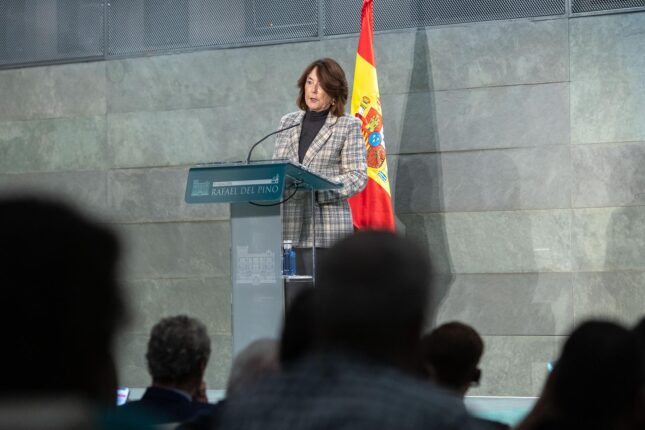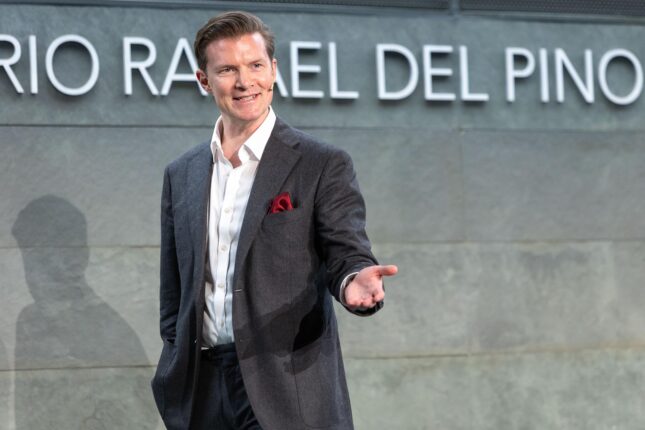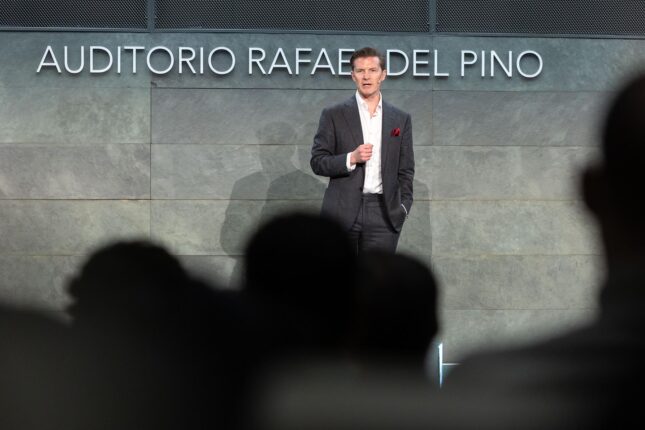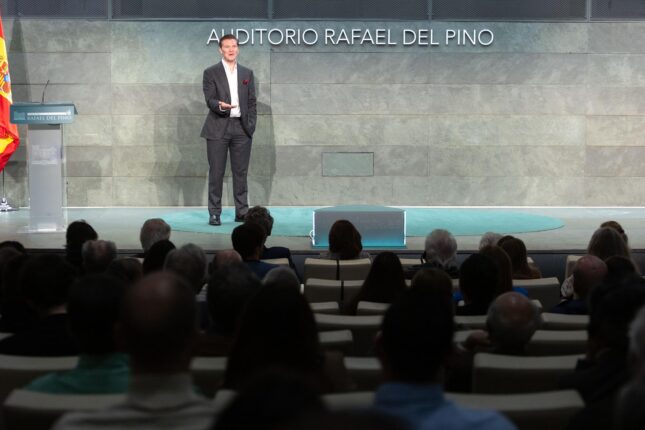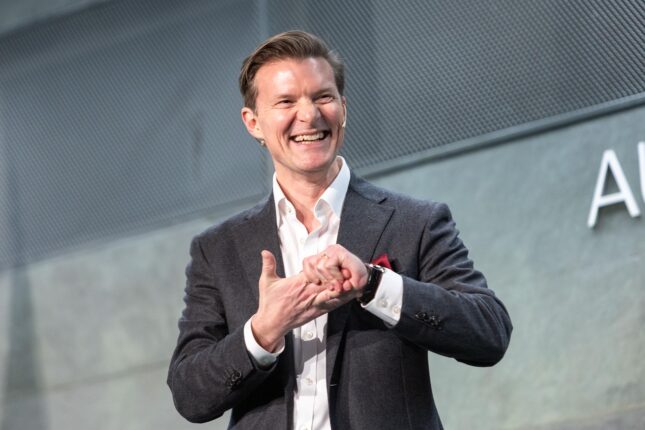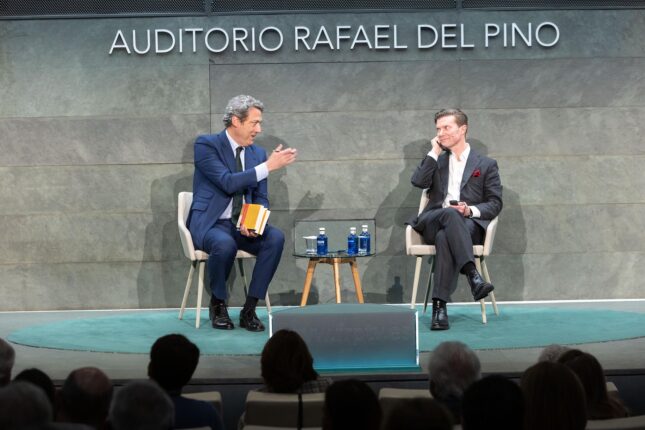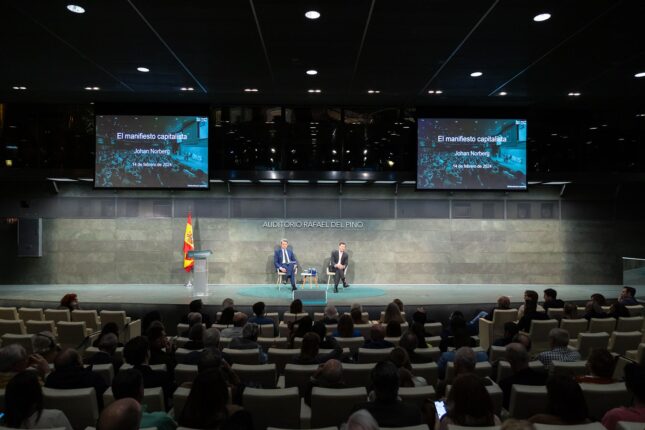Summary:
On 14 February 2024, the Rafael del Pino Foundation organised the conference "The Capitalist Manifesto", given by Johan Norberg, writer, lecturer and member of the Cato Institute in Washington D. C. and the Centre for International Political Economy in Brussels, on the occasion of the presentation of his book of the same title published by the Deusto publishing house.
Sometimes it seems that everyone is opposed to the free market ideas that have brought the world so much opportunity and wealth. Capitalism is now under pressure, it is seen as a plague on humanity. We see it in Hollywood, social media, social science. A poll shows that only 20% of Americans appreciate capitalism. That means more people believe in ghosts than in the benefits of capitalism. 36% internationally believe that humanity is doomed because of the environmental damage that capitalism has caused.
This is the view of left-wing governments, who think that the market is dangerous and that we need governments to intervene to repatriate production, kick out the technological and economic winners and give subsidies to make sure the jobs stay with us.
Now, too, it is coming from the right, which says that capitalism has only benefited the rich, that inequalities are increasing and that big business is taking over the planet. That is why we need more intervention, an industrial policy, more protectionism and a stronger, higher-wage welfare state. This was said by a member of the think tank American Compass, a think tank conservative, trumpist.
The problem with liberal ideas is that some people think about them as implying that nothing should be done about policy. If there is a problem in the world, a fundamental problem, the answer is supposed to be that nothing should be done. Of course, that doesn't sound very attractive.
Is that the case, that capitalism has failed? That is the message and the new ideology is to brand those who produce as evil and offer subsidies to those who do not produce. Complaints are a currency and there is a lot of wealth there. Is this narrative true? I don't think it is.
When you ask how capitalism is doing, you have to ask compared to what. That is the question. Because there are alternatives and how have they fared? I can understand the fear of global capitalism because it seems that the world is becoming more dangerous, that it is becoming more difficult. If we look back over the last twenty years it has been a horrendous time. We have had financial crises, endless wars, the pandemic, the invasion of Ukraine, now inflation and spiralling interest rates. So it's been a terrible twenty years, so it's understandable that openness and innovation don't sound so exciting. It seems we need someone to protect us, some government to take us by the hand and tell us what to do.
The sad fact is that these twenty years have also been the best in human history. Despite the horrors, if you look at objective indicators of living standards, they have never improved as much as they have in the last two decades. If we try to measure global wealth, the average income with GDP per capita, almost a third of all the wealth that man has created throughout his history has been made over these twenty years. Extreme poverty has been reduced, with 130,000 fewer people per day in extreme poverty over the last 20 years. Child mortality has halved, meaning that four million fewer children died last year than in 2002. Hunger problems have also improved. This is not what we would have expected.
If someone had told us twenty years ago that there were going to be wars, geopolitical strife, global financial crises and a pandemic that has killed millions of people and brought the world to a standstill, we would all have thought we were living in a post-apocalyptic world. But we have managed to get through it, somehow. We didn't have everything planned, nobody told us what to do. We didn't talk about anything and that's why it worked, because millions of people have been able to adapt, to be able to look at the world with their creativity and come up with the best solutions they could think of to solve all these problems. There was no plan, there were millions. That is what saved us and that is why these disasters were less disastrous than they could have been.
When the pandemic started, when the world closed, I started buying toilet paper, cans of food like crazy. And suddenly I started to think what a shame because suddenly the markets started to be full of goods. What had happened was that thousands of farmers' businesses, traders, saw what was happening and saw the price signals that spoke of shortages and new opportunities. Despite the tremendous impact, the whole European catering sector closed down and people hoarded things. Suddenly, experts started to think about solutions, and experts are not people who are in a specific place to think, but people who are in life, who think if we lack the resources, what can we do to make things better? If suddenly the workforce disappears, what can we do with those who come to work? If we suddenly find ourselves in a situation where governments close borders, how can we reorganise the delivery of goods to make it all work? Businesses managed to rebuild supply chains in real time. As Thoureaux said, it seems that trade is made of elastic because they manage to overcome obstacles. The achievement was fantastic and we didn't spend a minute thinking about what we were doing because it worked. It worked because entrepreneurs spent day and night rebuilding supply chains.
Then Putin invades Ukraine and we're back to square one. Because when one of the big food exporters invades another big food exporter, many people thought that there would be famine, that we would have no energy sources. But within a few months, prices returned to their level and were even cheaper than before the invasion. Natural gas prices dropped by 80% in a few months. Farmers, energy companies and liquefied gas exporters saw the opportunities, started producing and changed trade patterns to combat these shortages. Another thing that was not said in the news.
When a certain degree of freedom is given to all those people who work so hard, workers and entrepreneurs, improvising, innovating. We have managed to put all the crises behind us because of improvisation. So what we have seen in the last twenty years is successful capitalism, is the success of free markets. They have not just coped with the crisis; they have managed to improve the world. The improvements in hunger, in poverty, in health, are thanks to countries that have been able to integrate and function within free markets. Liberalism, capitalism, does not have to do nothing when the problem arises. What we do is allow experts to look at the problems and study the solutions. We are going to stop a government, a leader, from imposing constraints, from disrupting millions of people, from not allowing them to experiment. Because we know that in difficult times, when we don't know what is going to happen, that is the moment when we realise that we need all the knowledge and creativity we can get. This is what happens when we allow all these people to experiment with their business models, with their patterns, with their work and with their innovations.
This temptation for someone to take the reins to save us, big government, is a way of substituting the wisdom of millions of people and their constant experimentation. This is extremely dangerous if we think of it as centralisation, as authoritarianism. It is a way of losing knowledge and creativity. It is a way of saying take charge and sort it out, when this always fails.
Interventionist ideas are not new. They have been put into practice before. Price controls create shortages, tariff barriers result in job losses and politicians are quick to step in and question the choices millions of people have made. This results in total failure.
Those who talk about why we should subsidise winners do so on the basis of a few examples. If you subsidise everything, something succeeds. But those who study the outcome of these attempts see that after every success there are a hundred failures. There are also failures. This is how markets advance. When the state starts subsidising the winners, it short-circuits the whole process of discovery because it prevents markets from doing what they have to do to test commercial activity, which is what tells you if something doesn't work. This is dangerous. That's why we have this long list of failures of governments when we pick winners: in old shipping, in steel, in the fight against cancer, the supersonic Concorde.
The Maduro government's redistribution of wealth in Venezuela has been the biggest economic failure in modern history. GDP collapsed, almost seven million people have fled this experiment. When someone has all the solutions to all the problems, it prevents anyone else from looking for another solution. That is why it is so dangerous. These ideas have been put in place before and they always end up at the same point.
Most people who want a quick fix don't quite understand that it is difficult to innovate, to create wealth. It is as if they believe that business simply knows how to print money. They never find the ones that fail. Every great innovation was not created overnight, but through hundreds of experiments, trial and error, adaptation. Through small progress you get there. It was a completely different model. Innovation and economics are processes of discovery and that is difficult. Many people fail. But there are also business models with technological capabilities that enrich humanity. You have to get there, although it is like crossing a minefield.
What drives people to do it is the possible reward that, if you make it to the other side, you get to keep the fruits of your labour. It's the kind of incentive that encourages people to cross these minefields. Most don't get to that kind of wealth, but the important thing is that some do and can think of new goods and service. This is how humanity can continue to move forward. This is what businesses, innovators, capitalists do, they work day and night for others, they have to risk everything, they have to pay their workers, their suppliers, their loans. And they have to come up with goods and services that people are willing to pay for. Only then do they get to keep something. That's the profit. How much is that? Nothing, about 2%. The rest goes to everyone else. We get new goods and services and more purchasing power because prices fall as this happens. And the entrepreneur keeps a 2% if he is successful. A 2% of billions is a lot.
That there are billionaires seems unfair, that the world is deteriorating. But if you think about it, it doesn't matter how many zeros someone has behind the first digit in their account. What matters is what you can do with your money, what you buy, what you can afford. Now we have electricity, heating, food, longer life expectancy, medicines, prostheses, mobile phones, ... All these things are magic for our ancestors. But the most incredible thing is that all these are things we have in common with millionaires. They can have a private jet, drink expensive wine, have expensive clothes. But our ancestors wouldn't consider that the big complaint, compared to the fact that now we can see our grandchildren, we have running water, we don't think about where the money comes from, about food the next day, all these things that make life more comfortable are more equally distributed than at any time in history.
So we do not live in an unequal era, but in the most egalitarian one. Why? Because of those capitalists, entrepreneurs and innovators and that they have been allowed to become millionaires by transforming things that were luxuries for the very rich only a few generations ago, into things that almost everyone can afford in industrialised countries. That is wonderful, because they have found a way to walk through a minefield and keep 2% of the wealth they have shared with all of us.
That is the wonder of the free market, that you can only get rich by enriching others. It is the first system in which you can only accumulate wealth by bringing wealth to others and offering something that is more important than the money they give you. In previous systems (feudalism, slavery, socialism, fascism) the way to accumulate wealth was always by stealing from others. Capitalism is the first system in which the rich have become rich by offering something to others. That is a precious and highly moral system that recognises the dignity of each and every one of us because it gives us the right to leave and participate in arrangements only if we all believe that our life will be better than without those arrangements. But it is not a popular system, because it seems dangerous and unpredictable because it is based on freedom.
The Rafael del Pino Foundation is not responsible for the comments, opinions or statements made by the people who participate in its activities and which are expressed as a result of their inalienable right to freedom of expression and under their sole responsibility. The contents included in the summary of this conference are the result of the debates held at the meeting held for this purpose at the Foundation and are the responsibility of their authors.
The Rafael del Pino Foundation is not responsible for any comments, opinions or statements made by third parties. In this respect, the FRP is not obliged to monitor the views expressed by such third parties who participate in its activities and which are expressed as a result of their inalienable right to freedom of expression and under their own responsibility. The contents included in the summary of this conference are the result of the discussions that took place during the conference organised for this purpose at the Foundation and are the sole responsibility of its authors.
